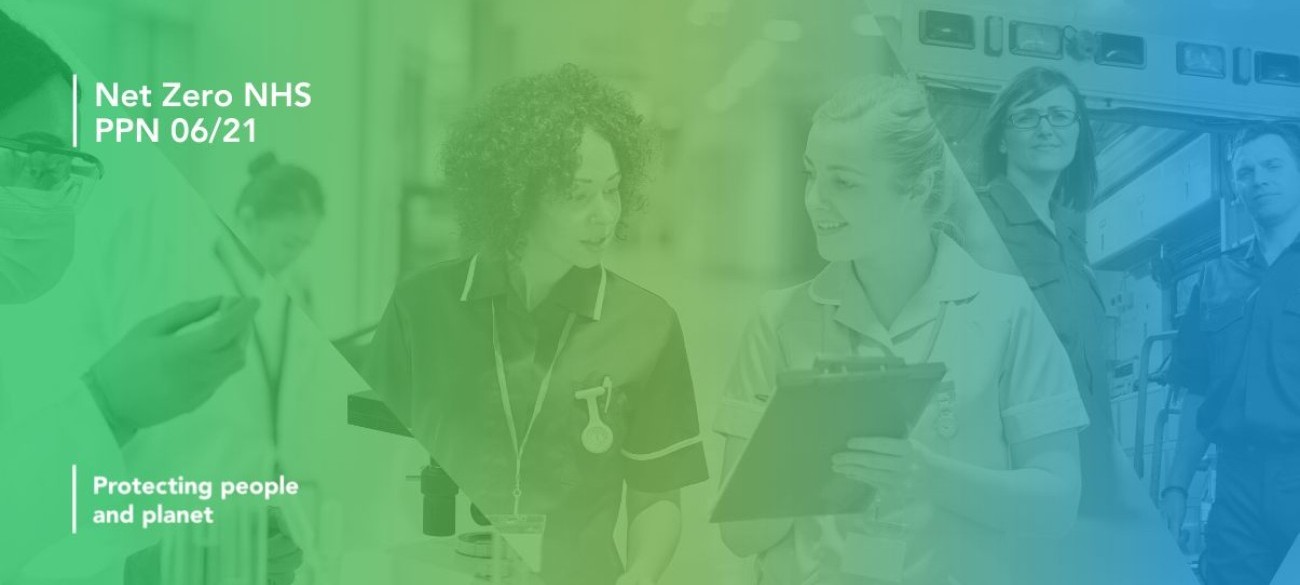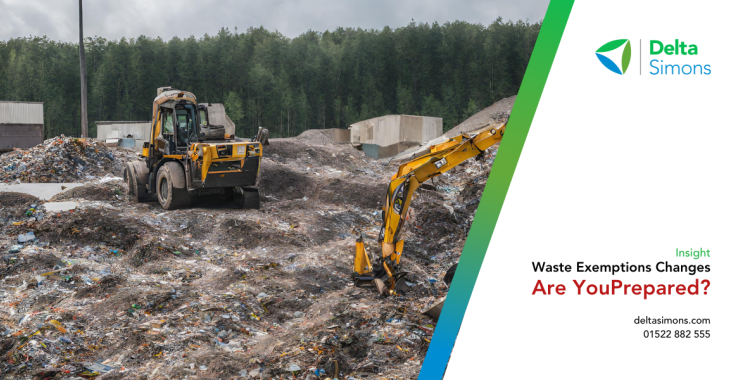Preparing for Net-Zero: What NHS Suppliers Need to Know About the New Carbon Reduction Plan Requirements
21 Feb 2023
Carbon management
Sustainability
Environmental Social Governance (ESG)
From April 2023 any suppliers bidding for NHS contracts above £5 million per annum will be required to publish a Carbon Reduction Plan (CRP) for their UK Scope 1 and 2 Greenhouse Gas Emissions and a subset of scope 3 emissions as a minimum (aligning with PPN 06/21).
This is the next critical step for the NHS’ roadmap to Net-Zero. But what effect will this new UK Government Policy have on our current emissions trajectory and how can suppliers adequately prepare for these changes to ensure service delivery continuity? Delta-Simons’ Sustainability Consultant Rob Dadzie discusses.
The National Health Service (NHS) is on a mission ‘To deliver the world’s first net zero health service and respond to climate change, improving health now and for future generations.’
In 2020, the NHS pledged to reach net zero emissions by 2040 for the emissions it directly controls and by 2045 for the emissions, it indirectly affects through the products and services it procures from its partners and suppliers. The NHS is estimated to account for 4% of the country’s carbon emissions, and over 7% of the economy. To achieve their targets, collaboration from all suppliers to the NHS, current and future, will be required.
In 2021, one year after the release of the "Delivering a Net Zero NHS" report, the start of the Greener NHS National Programme, the NHS England Public Board approved a plan to assist suppliers in aligning with the NHS's net zero goal by 2030. This plan directly affects all NHS suppliers both current and future. The next step on the NHS suppliers Net Zero Road Map comes into effect in April 2023.
Beginning April 2023: For contracts exceeding £5 million annually (excluding VAT), the NHS will require suppliers to disclose a Carbon Reduction Plan (CRP) to reduce their UK Scope 1 and 2 emissions, as well as a subset of Scope 3 emissions, in line with Procurement Policy Note (PPN) 06/21. Suppliers are required to have a publicly available CRP on their website and to share their CRP information as part of the procurement process.
What is the Procurement Policy Note 06/21?
In 2019, the UK became the first major economy to adopt a legal commitment to achieve ‘Net Zero’ carbon emissions by 2050 in line with Paris Agreement. To support this, the Government Commercial Function developed a new commercial policy measure for all central government departments and arm’s length bodies. This measure requires suppliers bidding for major government contracts (greater than £5m per year) to commit to achieving Net Zero by 2050 and publish a ‘Carbon Reduction Plan’.
Enacted in September 2021, the Procurement Policy Note 06/21 requires all major public sector suppliers to provide a Carbon Reduction Plan, which calculates mandatory emissions and states their commitment to achieving Net-Zero by 2050. In-Scope organisations are required to outline both existing and proposed mitigation measures for carbon reduction throughout their contract period.
This is another major step on the road to Net-Zero for the NHS with the next major milestone coming in April 2024 when requirements for carbon reduction plan to cover all procurements will be extended. See below for a brief overview of the NHS’ timeline to Net Zero.
- July 2022: The NHS became the first health system to embed net zero into legislation, through the Health and Care Act 2022.
- April 2023: For contracts exceeding £5 million annually, the NHS will require suppliers to disclose a plan to reduce their UK Scope 1 and 2 emissions, as well as a subset of Scope 3 emissions (in line with PPN 06/21).
- April 2024: The NHS will make it mandatory for all procurements to have a carbon reduction plan.
- April 2027: Suppliers will need to publicly announce their targets, emissions, and have a carbon reduction plan for global emissions aligned with the NHS’s net zero target, covering all of their Scope 1, 2, and 3 emissions.
- April 2028: New requirements for carbon footprinting for individual products supplied to the NHS will be implemented. The NHS will collaborate with suppliers and regulators to establish the scope and methodology.
- 2030: Only suppliers that can show progress through published progress reports and ongoing carbon emissions reporting via the Evergreen sustainable supplier assessment will be eligible for NHS contracts.
- 2040: Goal for emissions NHS control directly (the NHS Carbon Footprint), to be Net Zero
- 2045: Goal for emissions NHS can influence (NHS Carbon Footprint Plus), we will reach net zero by 2045.
Your Path to a Carbon Reduction Plan
Before you can create a Carbon Reduction Plan, you must follow the below steps:
- Conduct a carbon assessment,
- Calculate your carbon footprint and identify your emissions relating to Scope 1, 2 and 3,
- Set targets to reduce your emissions, including any Science Based Targets.
What is a Carbon Assessment?
A Carbon Assessment is a deep dive into how your annual activities are contributing to global emissions and therefore climate change. It outlines a strategy for addressing climate related impacts and encourages organisations to produce a plan for carbon reduction. A carbon assessment takes a 3-pronged approach by calculating annual emissions, setting targets to reduce emissions and developing a plan for achieving science-based targets.
As a trusted provider of sustainability services, our Sustainability team collaborate with our clients to build a robust analysis of emissions from annual activities as well as realistic targets and carbon reduction initiatives to ensure short-term and Net-Zero targets are met.
How is Carbon Footprint Calculated
An organisation's carbon footprint is calculated by gathering data across all areas of the business from utility consumption to delivering products to customers. As a seasoned provider of sustainability and carbon services our team builds a complete picture of carbon emissions across national and global organisations to better understand where the best and worst performing areas lie. Using this data we generate key performance indicators based on employee headcount, business floor area and revenue to create comparative metrics to ensure overall performance is improving year on year. The final product is a detailed report, with extensive analysis of emissions specific to an organisation and its activities.
Assessments are aligned to international standards such as the Greenhouse Gas (GHG) Protocol, PAS 2050 and ISO14067 – giving our clients the knowledge that your carbon footprint is both robust and comparable.
What Are Scope 1, 2 and 3 Emissions?
- Scope 1 – Direct emissions resulting from the primary combustion of fuels in organisation-controlled premises, vehicles and plant. Furthermore, fugitive emissions (gases which are not combusted but are released into the atmosphere) are also included.
- Scope 2 – Indirect emissions resulting from the consumption of purchased electricity that has been generated off-site and supplied by the national grid.
- Scope 3 – Indirect emissions associated with the consequences of the activities of the organisation but controlled by another entity outside of the corporate structure. Scope 3 emissions are often reported, voluntarily, by organisations who wish to assess the wider impact of their business operations.
(Source: Figure 1: GHGP scopes in the context of the NHS, Delivering a net zero NHS, 2020).
Science Based Targets
Science-based targets are the international standard for setting carbon reduction targets. Targets are aligned to the Paris Agreement to limit global warming to well-below 2oC above pre-industrial levels and strive to limit warming to less than 1.5oC. These are the levels at which irreversible damage to the environment is predicted to happen.
The benefits of setting a Science-Based Target include:
- Improve brand reputation by demonstrating commitment to the environment;
- Enhance ESG performance on your organisation;
- Reduce operating costs;
- Increase business resilience in relation to increasing fuel costs and climate risks;
- Win more work – it is now an expectation that suppliers to major organisations and local authorities have carbon reduction targets in place.
There are 5 stages to setting a Science Based Target; Commit, Develop, Submit, Communicate, Disclose.
Over the years, our team have helped multiple clients to commit by writing a letter of intent on your behalf to the Science Based Target Initiative and work with them to develop both ambitious and achievable targets. We have then helped guide them through the submission stage by completing the relevant forms for submission.
Communicating targets and demonstrating progress to key stakeholders is the next key stage. As a key supporter in our client’s Net Zero journey, we help to develop and tailor their message and provide important calculated data points to continue disclosing annual emissions.
What is a Carbon Reduction Plan?
Target setting is an important step to demonstrating sustainable commitment and limiting an organisation’s impact on the natural world. However, targets lack impact without a robust plan, which supports their purpose. Our Sustainability team have supported various organisations in developing their final Carbon Reduction Plan, with unique, tailored approaches to realistically target specific emissions.
The targets set for our clients allow us to recommend multiple carbon reduction initiatives with an estimated percentage impact on defined areas of the organisation's emissions. The Carbon Reduction Plan can be updated year on year with real data and a more accurate projection of emissions as organisations progress towards Net-Zero by 2050.
Beyond being able to deliver services to the NHS there’s a mutual benefit to taking climate action now and investing in effective, ambitious Carbon Reduction Plans. The ability to disclose your scope 1, 2 and a subset of scope 3 emissions and commit to climate action, installing Environment, Social, and Governance (ESG) and Sustainability policies and setting targets appeals to the modern investor, client and employee, as well as being the right thing to do.
If you are a supplier bidding for NHS contracts above £5 million per annum, you will need a published Carbon Reduction Plan (CRP) from April 2023 for your UK scope 1, 2 and a subset of scope 3 emissions as a minimum, aligning with government procurement policy PPN 06/21. Failure to do so will allow for the risk of being denied access to the healthcare supplier framework.
How Can Delta-Simons Help You Produce A CRP In Accordance With NHS Targets?
We work with clients from multiple sectors including; industrial, commercial and residential developers, retailers, industrial manufacturers, fund managers, institutional investors, hi-tech companies, the public sector and charitable organisations. Our own Carbon Reduction Plans have been reviewed and approved by the Science Based Targets (SBT) Initiative, demonstrating our competency in delivering comprehensive CRPs.
For the past 30 years, our team has provided a holistic suite of trusted environmental services and advice, designed to mitigate risk to both people and the environment, whilst removing the pain from planning or maintaining developments, buildings and/or assets.
If you are looking to partner with an environmentally conscious, holistic Sustainability and Carbon Assessment Services supplier, get in touch with our team by emailing info@deltasimons.com.






